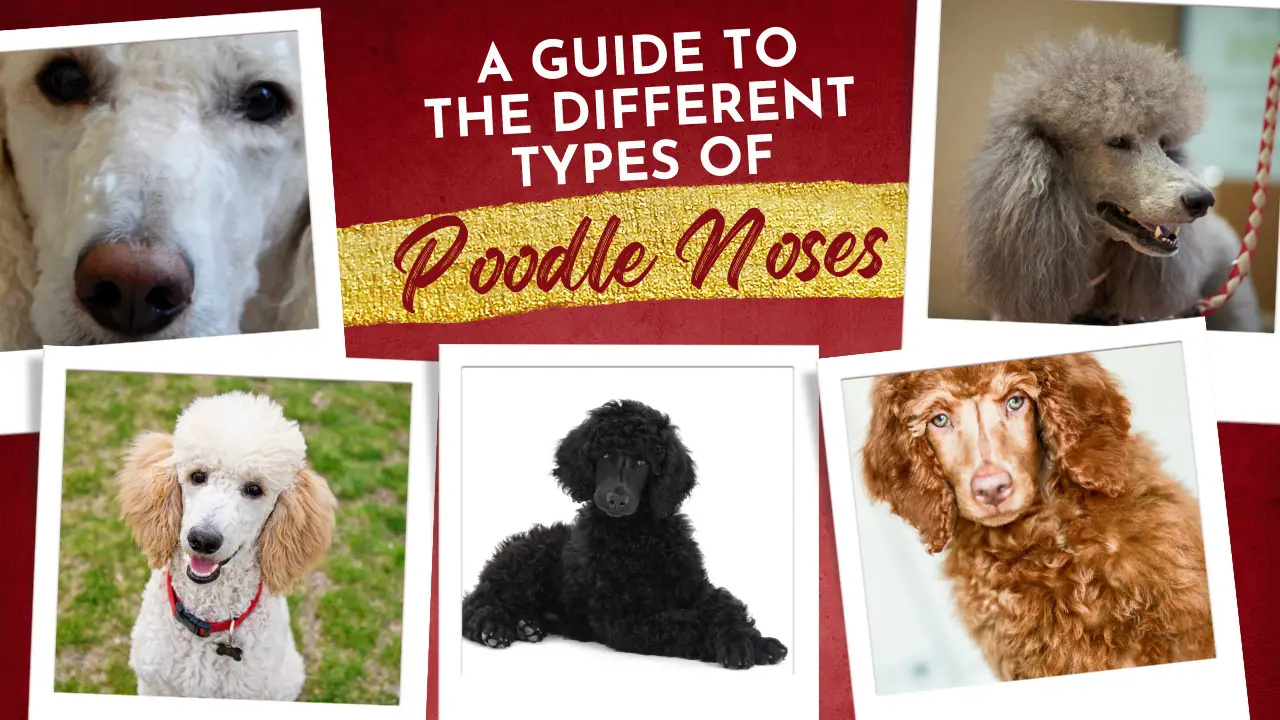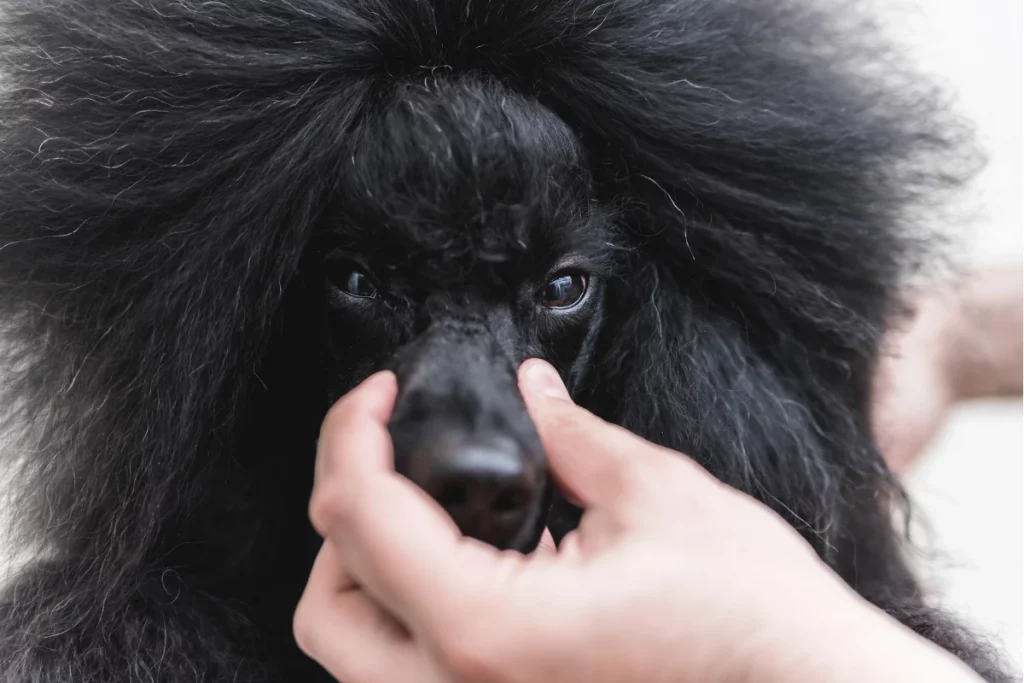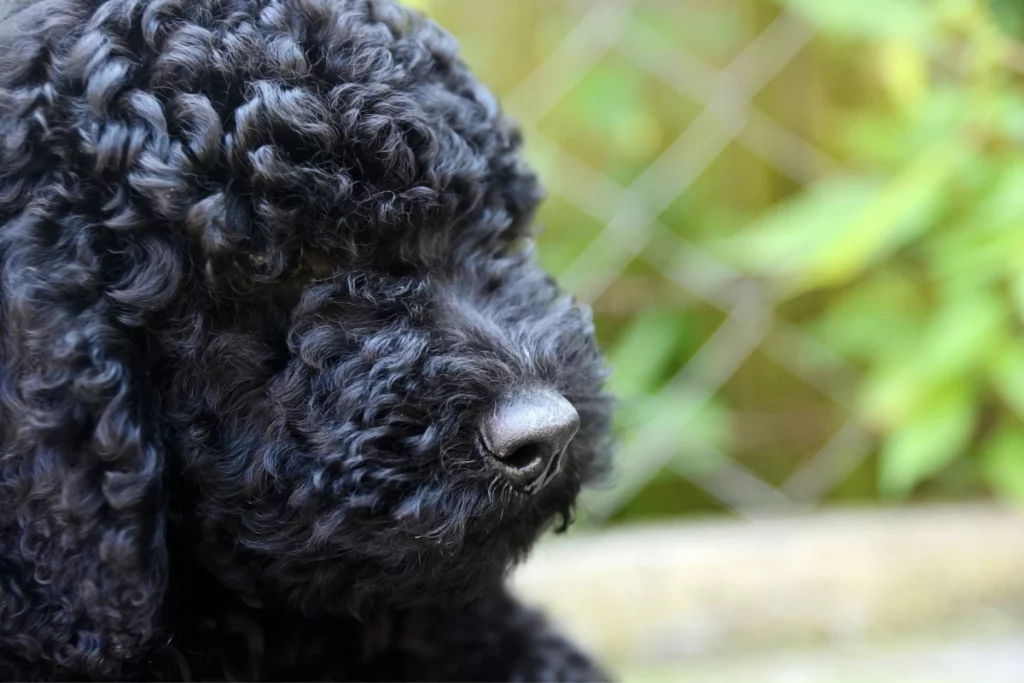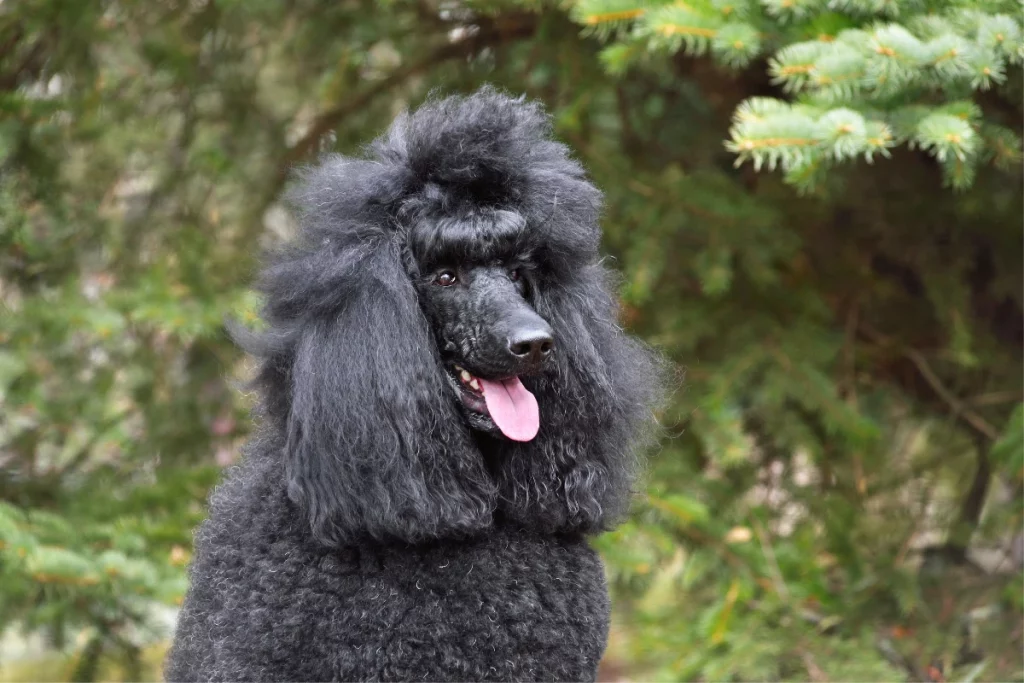While many factors can make a Poodle look cute or unique, one that often does not come to the forefront of people’s minds is its nose. Like humans, Poodles have distinctive noses that are different between each type of Poodle.

To help you, today I’m going to provide you within this article all the information you need to know about a Poodle’s nose.
What Will You Learn? 👇
Types of poodle noses
When it comes to the Poodle’s nose, there are generally two types: the long pointed snout and the teddy bear.

Read our Smart Poodles - Smart Tricks eBook for only $2.99
Dive into a treasure trove of engaging tricks and tips designed specifically for your poodle!

Why do Poodles have long noses?
One of the main reasons a Poodle has a long nose dates back to their hunting days. A Poodle is heavily dependent on its sense of smell, and a long nose helps sniff out any prey. Nowadays, though Poodles have been tamed and bred to be household pets, their noses aren’t used as much as they used to be.
🐩 Read this article if you want to know more on poodle whiskers.
Small (Teddy Bear) nose
On the contrary, the other common Poodle nose is the teddy bear button nose. This nose is mainly common in Miniature and Toy Poodles. Plus, due to the uprise of designer breeds, many dog breeders are striving to breed Poodles so they can have the teddy bear nose.
Health concerns in small noses

If you plan on owning a Poodle with a small teddy bear nose, there can be some downsides to it. After all, these dogs are supposed to have long noses due to their hunting instincts.
However, as soon as Poodles started being crossbred with other dogs, it caused short noses and many problems. Mainly the common health concerns faced with small noses are to do with their breathing due to the shape of their nose and windpipe. Typically, some of the common problems short-nosed Poodles face are:
Epilepsy
This is a neurological condition where Poodles have repeated seizures. Typical signs of epilepsy are twitching, full-body spasms, and disorientation. Most of the time, epilepsy in Poodles can be difficult to diagnose until they’ve had a seizure. However, once epilepsy is detected, Poodles are usually placed on life-long medication to control them.
Osteochondrodysplasic
Another health concern that sometimes exists in small-nosed Poodles is Osteochondrodysplasic, otherwise known as dwarfism. It does not exist in every small-nosed Poodle, although it’s likely to occur in Poodles that are deliberately bred to have a shorter nose.
This condition arises from a genetic mutation that stops the Poodle from growing and causes unusual movement. Typical signs of dwarfism are a large head, underbite, abnormal bone structure, short bones, large joins, and bowed front legs.
Hip dysplasia
This condition occurs in all types of Poodles due to overbreeding, inbreeding, and genetics. Hip dysplasia is a condition where their hip socket does not form properly, causing the ball and socket joint to not fit together properly. Because of this, a Poodle can suffer from painful joints and mobility problems if they don’t lose weight, have surgery or anti-inflammatory medication.
Tracheal Collapse
This is when a Poodles trachea (windpipe) closes up, causing the rings around it to collapse. Once the rings collapse, airflow is restricted, making it difficult for them to breathe. Typical symptoms are coughing, fatigue, and heavy breathing. This type of collapse can happen when a Poodle becomes overexcited, overeating, drinking, smoking, dust, extreme heat, weight gain or loss, and humidity.
Why is my Poodle’s nose turning pink?
Many dog owners become startled when they see their dog’s nose turn from a brown or black color to pink, especially when it comes to Poodles. The condition isn’t much to worry about, which happens due to hypopigmentation.
This change of color happens in the winter season most of the time, and it’s called snow nose or winter nose.
It’s not just restricted to the winter, though; this condition can also occur in tropical climates. However, there’s not much research conducted in this area as the effects are not that dangerous. Plus, a Poodle’s nose will eventually turn back to its normal color in time.
When to seek help from a vet
Most of the time, the change of color is due to snow nose. However, pay close attention if your dog is continuously rubbing their nose, has sores, the texture of the noise is changing, the nose is itchy or bleeding. If you notice any of this, you should take your Poodle to see a vet as they could have an underlying infection or disease. Their nose might also change due to small problems like eating or drinking from plastic bowls.
Do poodles have dry noses?

All types of Poodle can often suffer from a cracked, crusty, or dry nose from time to time. There are multiple reasons a Poodle can have a dry nose, such as dehydration or when they’re in hot climates. Their noses become dry due to blocked tear ducts that stop fluid flowing through the ducts and provide moisture in their nose.
Most of the time, there’s no cure for this, but moisture can be restored using nose butter. Do look out for other signs coupled with the dry nose, such as lethargy and more, as it could be something else.
Conclusion
Overall, if you’re considering getting a Poodle, you can generally find they have two types of nose: the small nose and the long nose. In particular, the small nose Poodle could have potential health problems like hip dysplasia, dwarfism, tracheal collapse, epilepsy, and more. However, these health conditions aren’t always guaranteed and can be ruled out through regular veterinary checks.
Sometimes their noses can turn pink in hot and cold weather, but this is not severe. They can also have dry noses. However, if you notice a Poodle being tired, not willing to play, and having unusual symptoms, it might be a sign that they need to see a vet to look out for any underlying conditions.
Do you know anything unique about a Poodles nose? Let us know in the comments down below.
Marko is the founder and author at PoodleHQ, where he blends profound expertise with formal training in Animal Behavior and Canine Genetics. With multiple generations of poodles under his care, he’s a breed connoisseur, honored with the Canine Care Excellence Award and lauded by the International Pet Enthusiasts Association.

